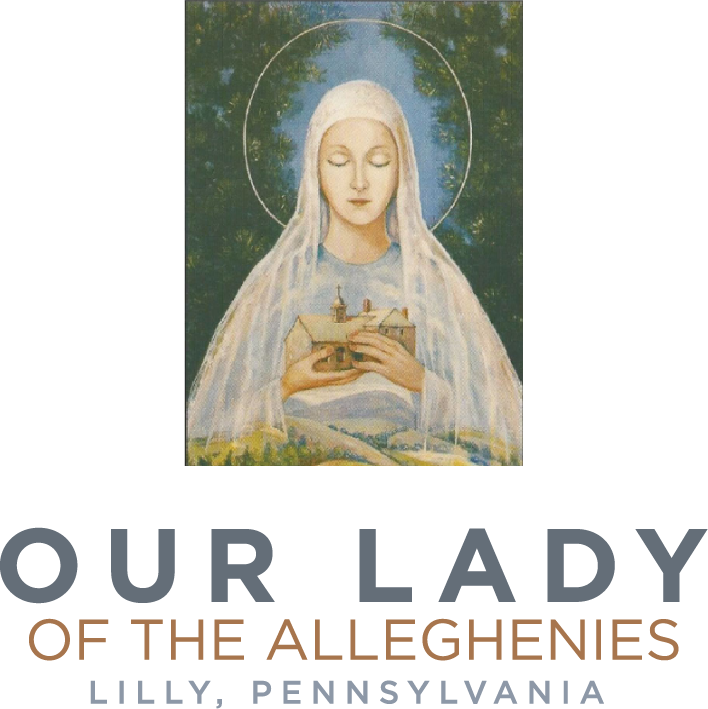I'm New
When you visit
Visiting a new church can be intimidating: What should I wear? Where do I park? Where do my kids go? We understand the many thoughts that can come from visiting a new church, so we want you to feel completely comfortable when you visit. Below are some frequently asked questions. If you have any additional questions, don't hesitate to contact us or talk with an usher when you visit.
What are the Mass times?
WEEKEND
Saturday Evening: 4:00 PM
Sunday Morning: 8:00 AM
10:00 AM
WEEKDAY
(unless indicated otherwise)
Monday through Saturday: 8:00 AM
HOLYDAYS OF OBLIGATION (unless indicated otherwise)
VIGIL 6:00 PM
8:00 AM
6:00 PM
When is confession available?
Saturdays: 3 :15pm to 3:45pm
First Fridays: 8:30am to 9:00am
Is there a time for Adoration of the Blessed Sacrament?
First Fridays: 8:30am to 9:30am
What should I wear?
Appropriate Dress code for a Church is modesty
How do I get to Our Lady of the Alleghenies?
Here is the address for the CHURCH and PARISH OFFICE: 608 Main Street, Lilly, PA 15938
Where should I park?
The Church building has an ample sized parking lot in the back of the building
Where do my children go?
All Children are welcome and encouraged to accompany their parents/guardians. There are "cry rooms" available should you need to use one for any reason.
I’m not Catholic ... so, how do I know when to sit, stand and kneel?
Try your best to follow along by following the congregation's movements, and do NOT worry about "getting it wrong." God is pleased to have you here!
I’m not Catholic ... is it okay for me to participate in communion?
Guidelines for the Reception of Communion
FOR CATHOLICS
As Catholics, we fully participate in the celebration of the Eucharist when we receive Holy Communion. We are encouraged to receive Communion devoutly and frequently. In order to be properly disposed to receive Communion, participants should not be conscious of grave sin and normally should have fasted for one hour. A person who is conscious of grave sin is not to receive the Body and Blood of the Lord without prior sacramental confession except for a grave reason where there is no opportunity for confession. In this case, the person is to be mindful of the obligation to make an act of perfect contrition, including the intention of confessing as soon as possible (canon 916). A frequent reception of the Sacrament of Penance is encouraged for all.
FOR OUR FELLOW CHRISTIANS
We welcome our fellow Christians to this celebration of the Eucharist as our brothers and sisters. We pray that our common baptism and the action of the Holy Spirit in this Eucharist will draw us closer to one another and begin to dispel the sad divisions which separate us. We pray that these will lessen and finally disappear, in keeping with Christ's prayer for us "that they may all be one" (Jn 17:21).
Because Catholics believe that the celebration of the Eucharist is a sign of the reality of the oneness of faith, life, and worship, members of those churches with whom we are not yet fully united are ordinarily not admitted to Holy Communion. Eucharistic sharing in exceptional circumstances by other Christians requires permission according to the directives of the diocesan bishop and the provisions of canon law (canon 844 §4). Members of the Orthodox Churches, the Assyrian Church of the East, and the Polish National Catholic Church are urged to respect the discipline of their own Churches. According to Roman Catholic discipline, the Code of Canon Law does not object to the reception of Communion by Christians of these Churches (canon 844 §3).FOR THOSE NOT RECEIVING HOLY COMMUNION
All who are not receiving Holy Communion are encouraged to express in their hearts a prayerful desire for unity with the Lord Jesus and with one another.
FOR NON-CHRISTIANS
We also welcome to this celebration those who do not share our faith in Jesus Christ. While we cannot admit them to Holy Communion, we ask them to offer their prayers for the peace and the unity of the human family.
© 1996, United States Conference of Catholic Bishops
Am I expected to put money in the offering?
No one is "expected" to give money as if they were paying for a sacrament, but it is a teaching in our faith to offer almsgiving. A suggested amount is 10% of one's income as tithing to the Church which helps the Church to continue to pay its bills and render service to the community.
I have a hearing problem. Is there any special assistance?
Unfortunately, we do not have any special assistance for those who have hearing issues.



